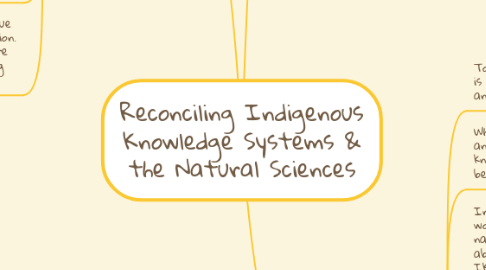Reconciling Indigenous Knowledge Systems & the Natural Sciences
by Alesha Guevarra

1. (2) Exhibit A
1.1. Both the IKS and the natural sciences acquire knowledge through imagination. In IKS, the indigenous people utilize imagination to seek a connection between another source of life to gain an understanding of its perspective. Furthermore, in the natural sciences, scientists need to use imagination to come up with explanations and to help understand the nature of things when the resources needed for the experiment are not available.
1.2. By limiting ourselves to only what we know, imagination as a way of knowing is able to widen our understanding on the natural world that can be incorporated in the IKS and the natural sciences.
1.3. Knowledge about the natural world is not so much gained in the IKS through imagination as much as the natural sciences. While knowledge in the natural sciences are used in order to create inventions for the betterment of society, knowledge in the IKS is used for survival and to ensure the repeated cycle of life can take place.
1.4. We don't value indigenous knowledge as much as we value scientific knowledge, something seen in modern civilization. Nowadays, resources are taken away from nature more often than a balance of civilization and nature taking place.
2. (3) Exhibit B
2.1. To know better about our nature, history, and economy is the purpose of the knowledge, and indigenous knowledge and the natural science are the foundation of that.
2.2. What do we human beings need is that to live better and more convenient, when we combine indigenous knowledge with the natural science, we can maximize the benefits of human and environment.
2.3. In a sense, without using imagination we can't see the world as it is, rather we see the world as we are. In the natural sciences, there is a driving force to know more about the natural world, which could also be said to the IKS as these two AOKs try to explain the phenomena of our surroundings, whilst acquiring shared knowledge. The use of imagination could contribute in IKS and the natural sciences as it would broaden the existing knowledge that is gathered within the AOKs.
2.4. In the natural sciences, there is a need to know more of the unknown, although it can also be applied in the IKS as indigenous people incorporate the acquirement of new environmental knowledge that could benefit them and the environment.
2.5. In indigenous knowledge and natural science, they need to constantly discover and explore, starting from guess and hypothesis, and then evolving into the last relatively complete thing.
2.6. knowledge is gather by the imagination, in terms of indigenous knowledge, the god of rice, and also gods whoever created things to human are not exist in reality, so indigenous people used their imagination. And the natural science uses imagination to create things, that is what we called as technology.
2.7. According to Dr. Tyson, ambition drives advancement in the natural sciences. In the case of the IKS, survival and conservation seem to be the main driving force of gaining new knowledge.
3. (1) Exhibit C
3.1. Indigenous knowledge has long benefited the natural sciences: it is such a rich source of knowledge that has been passed down from generations to generations without fail.
3.2. The IKS has been providing environmental knowledge to the natural sciences such as medicinal properties of plants that helped advanced the pharmacological development, and technological innovations such as the canoe, kayak and snowshoe.
3.3. Indigenous science integrates traditional knowledge and indigenous perspectives, while non-indigenous scientific approaches are commonly acknowledged as Western science. Both approaches contribute substantially to modern science.
3.4. Nowadays, knowledge in the IKS is being used in the natural sciences to understand wildlife for preservation efforts. Ultimately, this means that the natural sciences is starting to also give back to nature in a way by preserving it.
3.5. So far, it has always felt like it is only Indigenous Knowledge that feeds information to the Natural Sciences, but now that conservation efforts are being made, the Natural Sciences may now be providing knowledge to Indigenous Knowledge in order for nature preservation efforts.


